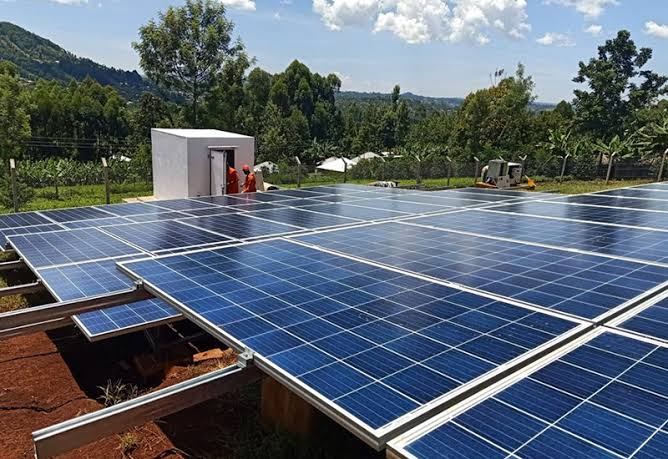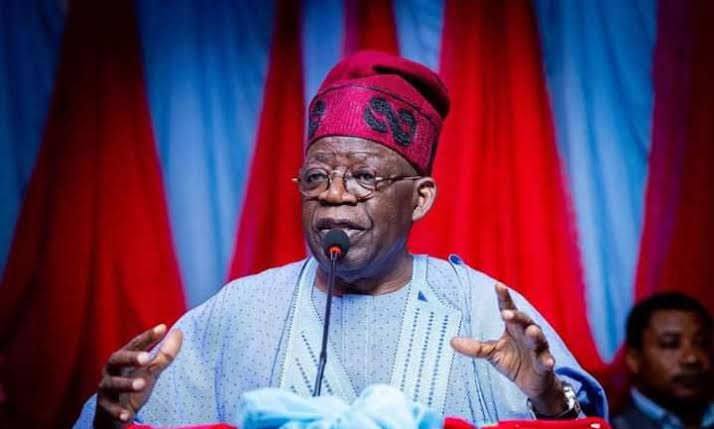News
EU ends six years of darkness in C’River community with solar mini-grid

By Francesca Hangeior
The European Union delegation to Nigeria and ECOWAS on Monday revealed that it funded a solar min-grid project for residents of Etomi community in Cross River State.
According to a statement by the EU, the community had been without electricity for six years.
“After six years without electricity, residents of Etomi community in Cross River State now enjoy reliable, clean, and affordable electricity through the European Union-funded solar mini-grid project. The solar project, which provides 119.5kW of electricity to over 600 households and businesses in the community, was implemented by GIZ,” the statement noted.
Inga Stefanowicz, Head of the Green and Digital Economy Section, EU Delegation to Nigeria and ECOWAS, explained that the grid is managed under a public-private partnership arrangement to ensure its sustainability and long-term maintenance. A private company is overseeing the operations of the grid, in partnership with the Cross River State Government.
Stefanowicz said the project is part of the EU’s Global Gateway initiative and is aimed to ensure that Nigerians have access to clean, renewable, and affordable energy.
“The provision of reliable, clean, and affordable electricity for domestic and commercial use will boost the social and economic development of the people. I am also glad to say that we are taking electricity to a cocoa-producing community. This will help their farming activities and processes greatly.”
The Cross River State Commissioner for Power and Renewable Energy, Eka Williams, explained that the solar mini-grid project is an off-grid system, and expressed the conviction that it would serve the Etomi community very well. “I want to say a very big thank you to my Governor, in partnership with the EU, who has made this possible. We have a replication of this in about four communities in Etung Local Government Area.”
A resident of the Etomi community, John Okpa, expressed excitement, as his community had been without electricity for over six years. He said, “Residents of the Etomi community are happy because the EU has provided us with electricity after six years of darkness. We are grateful to them, and pray that God continues to bless them.”
Another resident of the Etomi community, Precious Jeremiah, revealed that for seven years, she used a generator to run her hair-styling business. This, according to her, comes at a high cost of fueling, repairing, and servicing the generator. “Before the installation of the solar plant, I managed my business using a generator. The cost of fueling the generator is very expensive.
“Since the installation of the solar plant, my customers can come into my shop to get their hair done and enjoy a cool and clean atmosphere devoid of generator smoke and noise. Also, I can make enough profit to take care of my household, including paying for the school fees of my children,” she said.
News
Five Nigerian Secondary schools that allow students to operate mini businesses as part of their curriculum

In Nigeria a growing number of schools have adopted mini enterprise programs that require students to design products or services manage budgets market to real customers and reinvest profits.
These initiatives foster teamwork financial literacy and creative problem solving while generating small revenues that support school projects or charities.
Below are 5 standout institutions where student led ventures move beyond classroom theory into genuine marketplace operations setting graduates on a path to business success.
1. Loyola Jesuit College, Abuja
Each term, students form teams that research market needs, write detailed business plans and launch ventures such as handcrafted soap labels or small event-planning services.
They procure supplies, manage production, establish brand identities and sell through pop-up campus stalls as well as online channels. Faculty advisors lead sessions on cost calculation, bookkeeping and customer relations.
Profits fund outreach initiatives, reinforcing both civic responsibility and business know-how.
2. Greensprings School, Lagos
Under the Young Entrepreneurs Programme, students operate cooperatives focused on projects ranging from organic produce farming to custom T-shirt design.
A campus makerspace equipped with 3D printers and sewing machines enables rapid prototyping. Participants validate demand at public fairs and via social-media campaigns.
Professional workshops cover trademark registration, supply-chain logistics and online marketing strategies. A capstone pitch event invites business leaders who award grants and incubation opportunities.
3. Dowen College, Lagos
The BizTech Club integrates enterprise roles into the timetable by assigning students to positions such as chief executive, finance director or marketing lead.
Past ventures have included coding tutorials for primary-school pupils and a healthy-snack café on campus. Live performance dashboards display revenue, costs and customer feedback in real time, teaching data-driven decision making.
Field trips to tech hubs and talks by startup founders connect these student enterprises to Nigeria’s wider innovation ecosystem.
4. American International School, Abuja
In the Enterprise Challenge, cross-grade teams design scalable services, such as virtual peer-tutoring networks, sustainable cleaning cooperatives or mobile-device repair units, over a full academic term.
Senior students mentor juniors, and all participants submit funding proposals to an alumni investment panel. Successful teams receive revolving seed capital, dedicated workspace and official after-school-club status, ensuring continuity.
The programme builds leadership skills and establishes ventures that operate year after year.
5. British International School, Lagos
The Young Innovators Hub supports ventures spanning eco-friendly fashion (upcycling local textiles) to sensor-based waste-collection solutions.
Students attend weekend intensives on e-commerce development, customer segmentation and rapid-iteration techniques.
Collaboration with local SMEs provides real-world client briefs, enabling learners to deliver commissioned work and build professional portfolios.
Annual showcases connect student teams with investors, grant programmes and accelerator partners, accelerating the transition from a student side project to a full-fledged startup.
Embedding genuine enterprise activities in these curricula gives students experience testing ideas managing operations and learning from outcomes in a guided setting.
The initiative cultivates resilience creativity and fiscal discipline essential for success in Nigeria’s entrepreneurial landscape.
News
Alleged $1m scam: Supreme Court overturns Fred Ajudua’s bail

The Supreme Court has overturned a decision of the Court of Appeal which granted bail to Lagos businessman and former socialite, Fred Ajudua, who is standing trial for allegedly defrauding a German company of $1 million over three decades ago.
In a unanimous ruling on Friday, the apex court held that the Appeal Court erred in granting bail and ordered Ajudua’s return to correctional custody.
The court also directed trial judge, Justice Mojisola Dada, of the Lagos State High Court, to resume hearing of the criminal case.
Ajudua was initially charged before Justice Josephine Oyefeso of the Lagos High Court, but the case was later re-filed by the Economic and Financial Crimes Commission (EFCC) and reassigned to Justice Dada.
At his re-arraignment on July 6, 2018, Justice Dada denied Ajudua’s bail application on health grounds, noting that the case had suffered repeated delays for over 13 years.
“This case is one of the oldest in Lagos State. Bail is refused and the defendant is to be remanded in prison custody,” she ruled.
Following the ruling, Ajudua’s counsel, Olalekan Ojo, SAN, approached the Court of Appeal in Lagos, where Justice Mohammed Garba overturned Justice Dada’s decision, holding that bail was a constitutional right. The court also allowed Ajudua to remain free under his previous bail conditions.
Dissatisfied with this decision, the EFCC approached the Supreme Court.
News
TInubu admits taking tough decisions to enable Nigeria grow

President Bola Tinubu on Friday defended his administration’s economic reforms, saying he took some decisions to sustain healthy growth for Nigeria.
He stated this at the State House in Abuja while receiving a special envoy from the Amir of the State of Qatar, Dr Mohammed bin Abdulaziz Al-Khulaifi.
Tinubu noted that ongoing reforms to streamline Nigeria’s tax system have made it easier for foreign investors to do business in the country.
“We are making efforts to reform our tax system. Going by the experiences of the past and the need to depart from old ways, our reforms have been hard.
“I made tough decisions so that we could grow. We are gradually seeing the light at the end of the tunnel,” the President was quoted as saying in a statement by his spokesman, Bayo Onanuga.
“You can’t find a better partner than Nigeria. I always follow the global issues and your efforts. You have to do more in Nigeria to help fight poverty in the humanitarian area.
“You have done well in developing a knowledge-based economy in Qatar, but what about Nigeria?”
The President said Nigeria’s partnership with Qatar could be improved by looking into food sovereignty and economic prosperity.
Tinubu indicated Nigeria’s readiness to build on the momentum generated by his state visit to Qatar in 2024, pledging to implement all bilateral agreements between the two countries.
He directed the Minister of Budget and Economic Planning, Senator Abubakar Atiku Bagudu; the Minister of Information and National Orientation, Mohammed Idris; and the Minister of Foreign Affairs, Ambassador Yusuf Maitama Tuggar, to work together to ensure the timely execution of the agreements.
“To all the members of the delegation, I want to say a big thank you for coming to Nigeria. We are grateful to God for what we have experienced as partners in progress. I am also glad that the Amir of Qatar greatly remembers the issues discussed during my visit last year.
“Let me commend the brotherly relations between Qatar and Nigeria. The ambassador knows that I take Qatar very seriously. We are willing to go further in our bilateral relations,” he said.
According to Tinubu, the Qatari government has demonstrated maturity and foresight in working for global peace and deserves commendation.
“I am proud of your efforts to bring peace and stability to the world. I see your efforts in human development, peace, and prosperity. Like you, we are sandwiched between the challenge of terrorism and helping our neighbours. We are conscious of who our friends are and those helping us to ameliorate the problems,” he said.
Dr Al-Khulaifi, Qatar’s Minister of State for Foreign Affairs, conveyed Amir’s strong interest in expanding bilateral cooperation, announcing that a high-level Qatari business delegation would visit Nigeria in the coming weeks to explore opportunities in agriculture, food security, and other critical sectors.
He also conveyed the Amir’s desire to strengthen the strategic partnership with Nigeria, particularly in peace-building, agriculture, and petrochemicals. He expressed pride in the current level of relations and looked forward to expanding both government-to-government and people-to-people ties.
“We are proud of the level of relations we have reached with Nigeria. I am very impressed with our partnership with the country, which is not just government-to-government but also people-to-people.
“Our ambassador has been following up with the projects. We have much to do together in agriculture, food, and petrochemicals. We have some companies telling us that we should create a way for them to come into Nigeria,” he was quoted as saying.
Al-Khulaifi, whose responsibilities include mediating peace in Africa and the Middle East, added, “The message I have from His Highness, Amir of Qatar, is that he wants Nigeria to be a strategic partner in Africa,” he added.
-

 News16 hours ago
News16 hours agoJust in: Popular Yoruba traditional ruler joins his ancestors
-

 News20 hours ago
News20 hours agoExperts say helicopter firm may face criminal charges over Herbert Wigwe’s death
-

 News16 hours ago
News16 hours agoJust in: Nigeria is still owing us N190bn- IMF insists
-

 News15 hours ago
News15 hours agoJust In: JAMB releases 2025 UTME results, withholds 39,834 over misconduct
-

 Politics19 hours ago
Politics19 hours agoAwolowo’s grand-daughter resigns as LP executive committee member
-

 News20 hours ago
News20 hours agoS’Court judgment forces US military to remove 1,000 transgender
-

 News19 hours ago
News19 hours agoBenue on fire as gunmen kill APC leader, District Head on their farms
-

 News20 hours ago
News20 hours agoCount me out of ENDSARS killings in Lagos’, – Nnamdi Kanu





